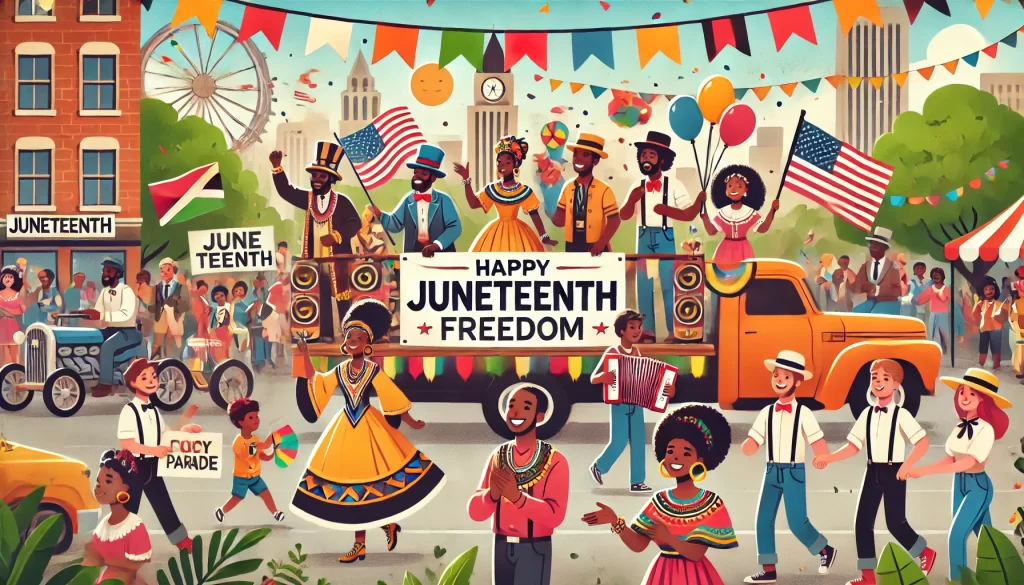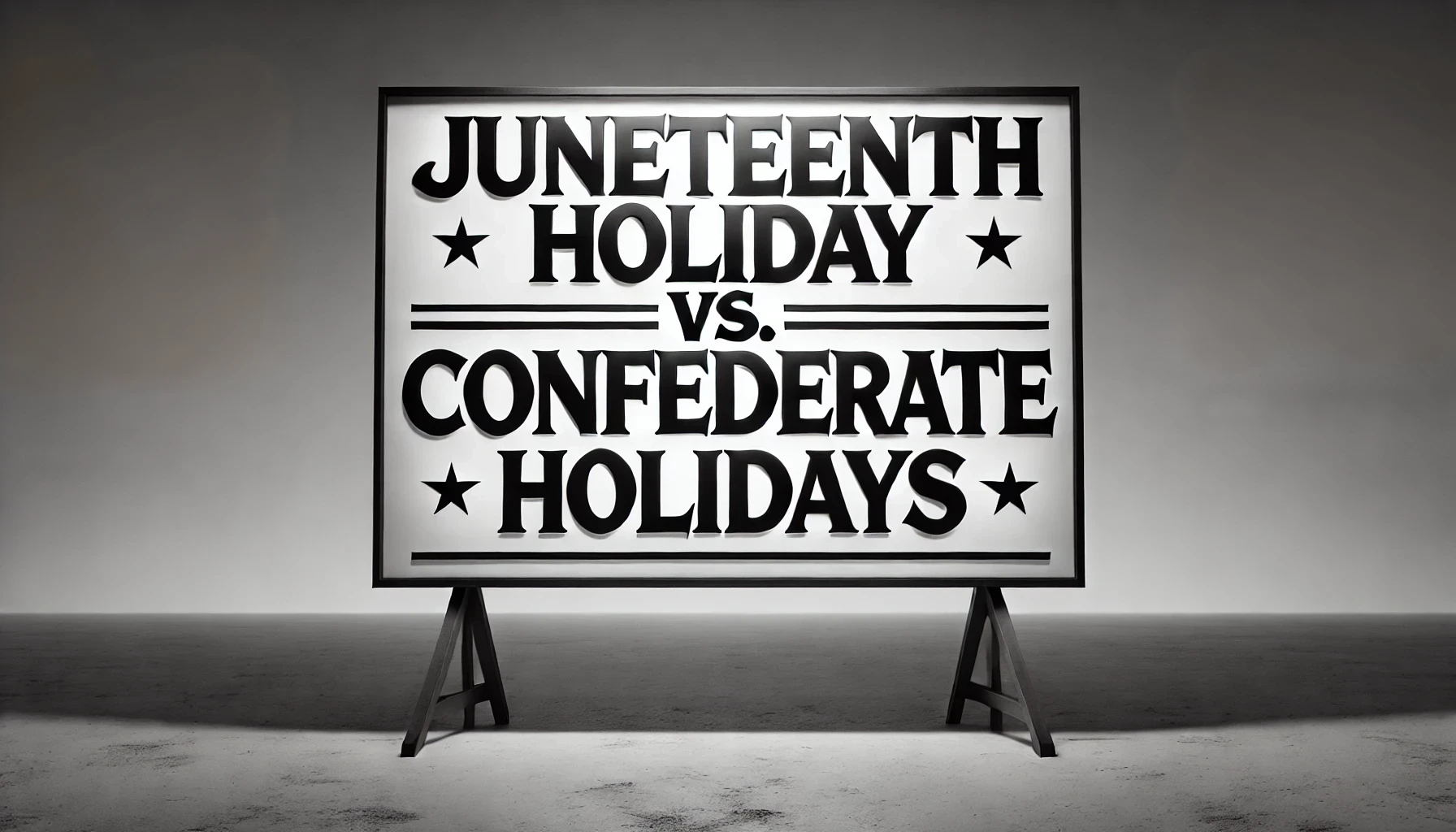As Juneteenth gains recognition across the United States, marking the end of slavery, a significant divide persists in some southern states, which continue to honor Confederate holidays. Juneteenth, recognized as a federal holiday since 2021, celebrates June 19th as a day to commemorate the emancipation of enslaved African Americans. Despite this, millions of Americans do not get the day off as it is not universally recognized as a state holiday.
According to the Pew Research Center, at least 30 states and the District of Columbia have officially declared Juneteenth a public holiday, with Rhode Island and Kentucky being the most recent additions. However, ten states in the South still maintain holidays that commemorate the Confederacy. These states include Florida, Mississippi, Alabama, Arkansas, South Carolina, and North Carolina, none of which officially recognize Juneteenth.
Mississippi and Alabama are notable for observing three Confederate holidays: Confederate Memorial Day, Jefferson Davis’s birthday (the Confederacy’s leader), and Robert E. Lee Day (honoring the Confederate army leader). In both states, Robert E. Lee Day coincides with Martin Luther King Jr. Day. Efforts to separate these joint celebrations have met with resistance.
In Alabama, Governor Kay Ivey has proclaimed Juneteenth a state holiday for four consecutive years. However, attempts to make it a permanent holiday have faltered. A proposed bill would have given state employees the option to take either Juneteenth or Jefferson Davis’s birthday off, but it failed to pass the state senate. State representative Juandalynn Givan, who sponsored the bill, emphasized the importance of acknowledging history, stating, “It’s an acknowledgment that history happened, and I think we need to do whatever we can to make sure our history is not lost.”

Some Black lawmakers objected to Alabama’s HB4 bill, highlighting the problematic nature of celebrating Jefferson Davis, an enslaver who believed Black Americans were inferior to whites. State representative Chris England, who abstained from voting on the bill, stated, “Black Americans often have to accept really big compromises to make really small progress.” Others, like Lisa Young, president of the Tuscaloosa county branch of the NAACP, warned that the compromise bill could undermine local efforts to recognize Juneteenth as a state holiday, adding, “Not treating Juneteenth the way all other holidays are treated is a slap in the face to African Americans.”
In South Carolina, a similar bill proposed that state employees choose between observing Juneteenth or Confederate Memorial Day. Despite being co-sponsored by state representative John King, the bill did not receive a vote. King underscored the importance of recognizing African and enslaved people’s history, especially amidst efforts to limit the teaching of this history in public education. “With the attempt and the assault by the Republican party to eliminate the education of our history in public education, it is essential at this time in our history that we have every attempt to acknowledge the history of African and enslaved people,” King said.
Efforts to separate the joint state holiday celebrating Robert E. Lee Day and Martin Luther King Jr. Day in Alabama have also stalled. State senator Vivian Davis Figures pointed out the stark contrast between the two figures, stating, “We’re trying to separate the holidays of two men whose ideologies were totally separate, from one end of the totem pole to the other. One believed in justice and fairness for all, and another believed in slavery.”
The continued recognition of holidays that honor the Confederacy has been met with criticism from social justice advocates. Camille Bennett, founder of the non-profit Project Say Something, argued that these holidays show a blatant disregard for the humanity of Black Alabamians. DaMareo Cooper, co-executive director of the Center for Popular Democracy, emphasized the inconsistency in honoring figures like Jefferson Davis alongside those who fought for civil rights, saying, “There’s no way that you can compare someone who literally fought for the highest ideals of human beings … to someone who was like: ‘I think these humans are checkbooks, they are cow, they’re like animals.’”
This article is based on the following article:
https://www.theguardian.com/us-news/article/2024/jun/19/states-that-do-not-honor-juneteenth

Background Information
Juneteenth
What is Juneteenth? Juneteenth, celebrated on June 19th, marks the day in 1865 when Union soldiers arrived in Galveston, Texas, and informed enslaved African Americans that they were free. This was two and a half years after President Abraham Lincoln issued the Emancipation Proclamation on January 1, 1863. The proclamation declared all enslaved people in Confederate states to be free, but it took time for the news to reach all parts of the country, especially the remote areas of Texas.
Significance of Juneteenth Juneteenth symbolizes the end of slavery in the United States and is a celebration of freedom and African American culture. It has been observed as a community celebration for over 150 years, with festivities including parades, music, cultural performances, and educational events. In 2021, Juneteenth was recognized as a federal holiday, highlighting its importance in American history.
The Confederacy and Confederate Holidays
The Confederacy The Confederacy refers to the group of 11 Southern states that seceded from the United States in 1860 and 1861, leading to the American Civil War. These states formed their own government, the Confederate States of America, in an attempt to maintain their way of life, which included the institution of slavery.
Key Figures in the Confederacy
- Jefferson Davis: The President of the Confederate States of America. Davis was a staunch supporter of slavery and believed in the supremacy of the white race.
- Robert E. Lee: The leading general of the Confederate Army. Lee is often celebrated in the South for his military leadership, despite his role in defending the Confederacy and its values, including slavery.
Confederate Holidays Several Southern states continue to observe holidays that honor Confederate leaders and events:
- Confederate Memorial Day: A day to honor Confederate soldiers who died in the Civil War.
- Jefferson Davis’s Birthday: Celebrates the birth of the Confederacy’s president.
- Robert E. Lee Day: Commemorates the birthday of the Confederate general.
Controversy Over Confederate Holidays These holidays are controversial because they honor individuals and a government that fought to uphold slavery. Many people see them as a celebration of a painful and divisive period in American history. Efforts to maintain these holidays are often seen as attempts to preserve a legacy of racial inequality.
The Civil Rights Movement and Martin Luther King Jr.
The Civil Rights Movement The Civil Rights Movement was a struggle for social justice in the United States during the 1950s and 1960s. Its goal was to end racial segregation and discrimination against African Americans and secure legal recognition and federal protection of their citizenship rights.
Martin Luther King Jr. Dr. Martin Luther King Jr. was a prominent leader in the Civil Rights Movement. He advocated for nonviolent resistance and played a key role in ending legal segregation and advancing civil rights legislation. His birthday is celebrated as Martin Luther King Jr. Day, a federal holiday recognizing his contributions to the fight for equality and justice.
The Debate Over Historical Recognition
Acknowledging History The debate over Juneteenth and Confederate holidays highlights broader questions about how history should be remembered and honored. On one hand, Juneteenth celebrates the end of slavery and the progress made towards racial equality. On the other hand, Confederate holidays are seen by many as glorifying a past that sought to maintain racial oppression.Educational Impact Understanding this debate is crucial for comprehending current discussions about race, history, and identity in America. It illustrates the challenges of reconciling different aspects of the nation’s history and the ongoing efforts to address historical injustices.

Debate/Essay Questions
- Should all states in the United States recognize Juneteenth as an official public holiday? Why or why not?
- Is it appropriate for states to maintain holidays that honor Confederate leaders and the Confederacy? Why or why not?
- Can the coexistence of Juneteenth and Confederate holidays be justified in states that observe both? Why or why not?
Please subscribe to Insight Fortnight, our biweekly newsletter!
